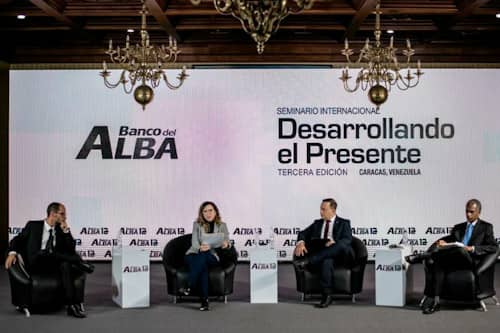Under the theme “Developing the present. Contributions to a post-pandemic economy,” the Bank of ALBA held on Monday its Third International Seminar.
On this occasion, the Bank of ALBA’s international seminar was attended by the Foreign Ministry’s Vice-minister of Multilateral Affairs Daniela Rodríguez, the President of the Bank of ALBA’s Board of Directors Raúl Li Causi, and Samuel Robinson Institute’s researcher Diego Sequera.
Vice-minister Rodríguez discussed the pandemic and its impact on the global geopolitical situation, and highlighted it does not only affect the life and health of the people, but it also poses a threat to the countries’ development, equality and economic progress, leading to growth in the world’s inequality, and that the only sustainable alternative to face it is through an effective, multidimensional, inclusive cooperation.
Rodríguez explained the Latin American and Caribbean region has been experiencing and promoting a new vision of integration with the creation of the ALBA-TCP, CELAC, UNASUR and new platforms of cooperation with different parts of the world and growing powers such as Russia, China and Iran. This, she said, has heightened geopolitical tensions by reducing the scope of action of the United States, which has responded by attacking progressive alliances formed in the continent in the last decades.
Likewise, the diplomat went deeper into the relation between the pandemic and neoliberalism, affirming that it is difficult to live and fight against the COVID-19 sanitary crisis within the neoliberal system as it rules out cooperation as the only salvation of humanity.
“We need to preserve the life of our people and guarantee all the people in the world can access the vaccine,” she stressed.
The Vice-minister for Multilateral Affairs also discussed the pandemic and cooperation, and shared figures on economic contraction, growing poverty and hunger and the COVID-19 impact on the UN Sustainable Development Goals.
“Only a single cooperation goal, enabling solidarity among the peoples, could represent victory,” she stressed.
The President of the Bank of ALBA’s Board of Directors, Raúl Li Causi, lectured on the aspects related to the new regional financial architecture and the Bank of ALBA’s achievements since its creation 12 years ago.
Li Causi explained the pandemic is not the only thing causing problems in the region, but also the illegal, unilateral coercive measures imposed by the U.S. on three countries: Venezuela, Cuba and Nicaragua. He divided his lecture into three parts: First, financing development in the American continent. By using a historical approach, he contrasted the Bolivarian integration perspective with the U.S. expansionist, antagonistic model inspired by the Monroe Doctrine; second, cooperation for post-pandemic development; and third, “Bank of ALBA, 12 years developing the present.”
Regarding the Bank of ALBA’s achievements, Li Causi mentioned increased health and food security, strengthening of regional transport through financing to Liat and Conviasa airlines, energy security through a joint work with Petrocaribe, and ensuring financial stability.
Finally, Samuel Robinson Institute’s researcher Diego Sequera discussed the role of sovereignty and independence, and the role played by the United States during the pandemic.
Sequera explained the region has experienced two approaches to address the sanitary crisis.
“We can see Venezuela’s fighting with so little and under a huge pressure, like Cuba and Nicaragua. On the other hand, we see countries with a total freedom of political action in all aspects have not been able to deliver security or dignity to their people during this difficult time,” said Sequera.
Samuel Robinson Institute’s researcher noted the two countries with the worst response to COVID-19 are those who inherited a master-slave mentality: The United States and Brazil. They both lead the world in deaths and infections.
